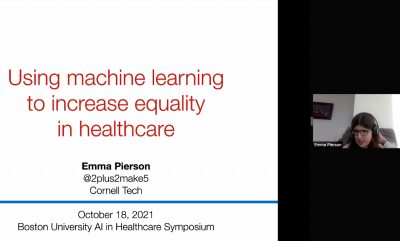Artificial intelligence and social media have many useful applications, but their use may affect and accentuate inequalities and disparities, and add to the spread of health-related misinformation, as discussed at an event hosted by the Rafik B. Hariri Institute for Computing and Computational Science and Engineering Monday.

The event — “Artificial Intelligence in Healthcare Symposium: Mitigating Disparities, Biases and Misinformation” — was an opportunity for scholars across a myriad of disciplines to discuss this critical intersection between healthcare and artificial intelligence.
The symposium was held over Zoom, with two panel discussions and presentations in the morning, and two more in the afternoon.
The event was spearheaded by Yannis Paschaldis, a professor at the College of Engineering at Boston University, and Gianluca Stringhini, an assistant professor in the department of electrical and computer engineering.
“Our objective was not only to discover how biases affect health and health care … but also to explore how AI and algorithmic methods can help mitigate these biases and these effects,” Paschaldis said in his opening remarks.
Stringhini said plans for the event began about six months ago and originated from a focus research group that the Hariri Institute created. Stringhini said they opted for a fully virtual event to allow anyone to join the all-day event.
“The Hariri community would identify important topics that research was needed on and then we would work together for a year, to basically build connections and collaborations across the entirety of BU,” Stringhini said in an interview.
Rich Caruana, a senior principal researcher at Microsoft, spoke later in the morning at the panel discussion, “AI in Healthcare, Algorithmic & Data Bias, and Mitigation Strategies.” He explained how machine learning models could work well, or be “dangerous” for certain patients.
“If you’ve got a very effective treatment it’s very easy for the model to learn that someone is low risk, when in fact they’re high risk and the only reason they’re low risk is because there’s an effective treatment, and that’s really tragic.”
Biases can also develop from drawing data from non-diverse populations, said Derry Wijaya, an assistant professor in the department of computer science who spoke at the panel “The Challenges, Risks, and Opportunities of AI in Healthcare.”
Wijaya said when predicting baldness in a certain population, for example, the AI will not be as accurate or safe when predicting outside of that population.
“One of the ways we can improve equity is to have more diverse perspectives so that when we develop programs and systems, it will be something that can address the needs of a diverse set of people, not just a proportion of the population.” Wijaya said.
Following the morning discussions and presentations, attendees were invited to join a virtual platform called Gather, which created a unique experience for attendees with the platform’s customizable avatars and rooms. Event attendees could navigate through different virtual rooms, examine research and interact with researchers.
The virtual platform allowed researchers, like Samad Amini — a third year doctoral student in ENG under the department of electrical and computer engineering — to share their work and interact with event attendees.
Amini shared his research on detecting dementia, which showed how a simple interview and drawing test can be used in tandem with a deep neural network to produce a prediction that is more accessible and cost-effective.
“I learned a lot from the symposium here, and now it’s my turn to present my poster and work, and I will get some feedback from others to kind of improve my work later on,” Amini said.
Sandro Galea, dean and professor at the BU School of Public Health, spoke during the healthcare panel. He said while there’s a potential for AI to improve healthcare, there will be challenges.
“We should lean into it [AI],” Galea said. “We should be having these conversations, and the mountain of challenges, to my mind, are really large that we’ll have to overcome before this makes a real contribution to healthcare.”


























































































































